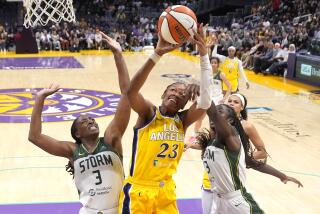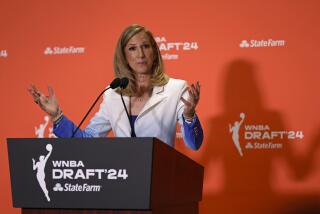Seattle filled with glee — and guilt — over NBA bid
SEATTLE — This is a city that knows how to nurse a grudge.
Seattle basketball fans never got over their anger when Starbucks Chief Executive Howard Schultz signed the deal in 2006 that would ultimately send the beloved SuperSonics to Oklahoma City. Try Googling “Howard Schultz” and, take your pick, “traitor,” “Howard the Coward” or “evil incarnate.”
Fan forums endured for years sharing venom and regret over the team’s reemergence in 2008 as the Oklahoma City Thunder. Guys in Sonics hats showed up at Schultz’s book signing at a Costco in 2011 and proudly videotaped themselves getting thrown out. A documentary film, “Sonicsgate,” explored in excruciating detail the raw deal that preceded the transfer and the civic pain that ensued.
So it perhaps comes as no surprise that as Seattle prepares to snatch Sacramento’s NBA team away to the Emerald City, one of the prevailing emotions — just half a step behind the elation, it seems — is guilt. They’ve been there. It’s not nice to gloat, and Seattle is a town that spends an inordinate amount of civic time figuring out how to do the right thing, even while continuing to keep resentful score against those who don’t.
“Believe me, I’m rooting for Chris Hansen and Steve Ballmer in their quest to bring the Kings to Seattle,” columnist Steve Kelley wrote this week in the Seattle Times, referring to the hedge fund manager and the Microsoft chief executive, respectively, who lead the group attempting to buy the Sacramento team. “But I can’t help thinking how rotten this deal is for Sacramento’s basketball fans.”
In an informal online survey, 57% of more than 11,400 Seattle Times’ readers who responded said they would “feel Sacramento’s pain” if the team made the move to Seattle, if “only a little bit.” Seattlepi.com asked its readers whether Seattleites weren’t all being “huge hypocrites.”
“The thing is, we feel great about this. It’s awesome. This is our dream come true. And it’s hard to have any conversation that doesn’t sound like you’re gloating,” said Brian Robinson, a real estate investor who co-founded “Save Our Sonics” in response to the Oklahoma City sale. In 2011, he started a group that lobbied for a new arena in Seattle to host an NBA team.
“The one thing we really understand is there’s nothing we can say that’s the right thing to say to Sacramento. There’s nothing that can make it better,” Robinson said. “I think it’s important that Seattle fans just stay away and allow people in Sacramento to process this, and maybe there’ll be a day when we can come together and have that conversation. But it’s not now.”
The deal, if all goes through, will leave Seattle with a new $490-million basketball and hockey arena on the edge of downtown, alongside the Mariners baseball stadium and Seahawks and Sounders football and soccer facility. Together, they would make up one of the biggest sports and entertainment complexes in the United States.
The city also faces a staggeringly complex logistical challenge, preparing to begin construction of a basketball arena and a previously planned waterfront tunnel project — also a massive endeavor — next to one of the busiest shipping ports on the West Coast.
The arena deal the city and county negotiated with Hansen, Ballmer and their partners is a sweeter deal for Seattle than the big public subsidies Schultz and Oklahoma City buyer Clay Bennett were demanding before the Sonics fled.
This time, most of the money would come from private investment. The $200 million in bonds put up by local government are to be repaid with rent and tax revenue generated by the project.
Seattle City Councilmember Tim Burgess, who led the council’s review of the arena proposal, said the project would provide $40 million in extra revenue to pay for transportation improvements to help move freight and pedestrians along the busy waterfront.
“I view this as a real opportunity,” Burgess said.
The hurdles ahead are myriad. Two lawsuits have been filed to block construction of the arena, one by area longshoremen, who fear the ever-expanding sports complex will kill industrial jobs in what historically was a working waterfront, not a mecca for tailgate parties and victory rallies.
An environmental impact statement must be completed before the arena can be built.
And Sacramento, to the consternation of many here, seems still not to have conceded what Seattle regards as the obvious. Mayor Kevin Johnson announced Tuesday that he had assembled 19 local investors who pledged at least $1 million each to buy the NBA franchise and keep it in Sacramento.
“Don’t celebrate too early,” he advised Seattle.
Seattle, though, is doing just that — with apologies to Sacramento.
“They actually have a mayor who’s fighting, and who has their back, and they’re having a chance to pitch a new arena at the NBA Board of Governors meeting, which Seattle never had. Our mayor was just a sellout who took a buyout,” said Adam Brown, who produced the Sonicsgate documentary.
That mayor, Greg Nickels, lost his bid for a third term in 2009, the year after the Sonics started playing in Oklahoma City, after coming in third in the primary, failing to qualify for the general election ballot.
Seattleites say they’d rather be celebrating the creation of an expansion team, but emphasize that the current state of affairs is not their fault. “Seattle is not taking a team away from anyone. These are sports owners who are engaged in business, and professional sports teams move occasionally,” Burgess said.
Of course, that’s what Oklahoma City said five years ago.
“I think Sacramento fans are absolutely justified in feeling all of the emotion and anger that they’re feeling. It certainly feels that the team is being stolen,” Brown said. “The cruel irony of this entire situation is that the only way to get a team back in Seattle is to break the hearts of fans in another city.”
More to Read
Sign up for Essential California
The most important California stories and recommendations in your inbox every morning.
You may occasionally receive promotional content from the Los Angeles Times.










